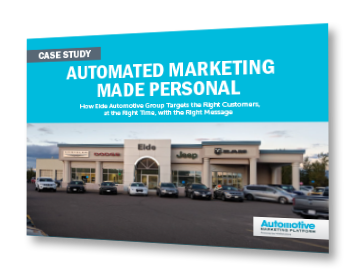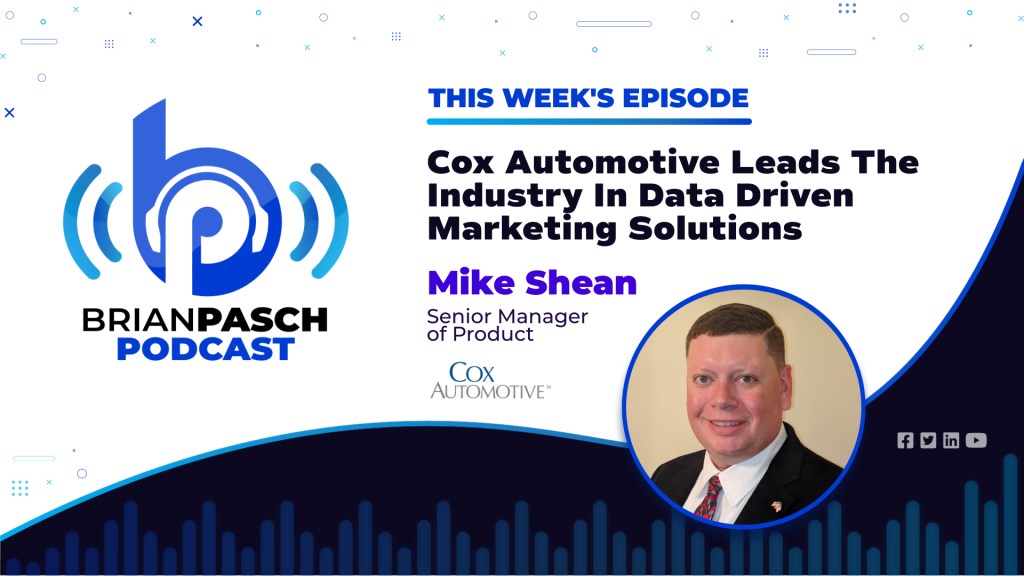Marketing moves fast. The tools, tactics, and technologies that were effective just a few years ago have given way to new approaches that prioritize personalization. It’s no longer all about the business—it’s about what your business can do for your shoppers.
Traditional dealership marketing tactics, like birthday cards and purchase anniversary emails, aren’t cutting it anymore. Today’s consumers expect your dealership to provide real value with every interaction. They want personalized, relevant marketing that meets their needs, when they need it.
Failing to provide the experience shoppers expect means limiting your sales potential. Is your dealership’s marketing meeting consumers’ expectations, or is it holding you back? It isn’t always easy to identify when there might be a problem.
Whether you think your marketing is doing just fine or you know you have room for improvement, keep reading for six signs that your marketing might be limiting your success.
1. You’re Seeing Declining Marketing Results
Let’s start with the most obvious sign first: declining marketing results. Marketing—and the technology that powers personalized customer connections—moves pretty fast. It can be a lot for any dealership marketing team to keep up with constant changes.
Falling behind the marketing times often results in poor or declining marketing results from your website and digital advertising, fewer calls, less traffic, and fewer unique hits.
The key to reversing declining marketing results is getting to the true root cause of the problem. Whether the issue is your technology, your messages, the way you’re using your budget, or some combination, identifying specific problem areas is a crucial first step. Making changes—even sweeping ones—when you don’t know what is underperforming probably won’t help.
2. You’re Having Difficulty Tracking ROI
A solid understanding of your marketing ROI can give you an accurate, data-driven picture of where you are and where you’re going. It can help you make course corrections and understand what kinds of messages are most effective at engaging your customers. Unfortunately, another sign that your marketing might be holding you back is that you don’t know how your marketing is performing or it is very difficult to track.
Non-integrated marketing tools make monitoring marketing campaigns cumbersome. It requires pulling information from fragmented systems and compiling and comparing data to determine marketing effectiveness.
When you streamline your auto dealership software and your marketing vendors, however, you also streamline your ability to monitor your marketing campaigns. You can quickly make changes to poor performing campaigns and make strategic marketing decisions across your entire business. Simplification of systems equals simplification of tracking marketing effectiveness.
3. You Have a Fragmented, Generic Marketing Approach
To truly personalize your marketing, you have to rely on tools and data to give you insights about your shoppers. If you have an incomplete view of your consumers, that is impossible to do. Without the right data, you’re forced to deliver disjointed, generic marketing. This type of marketing treats every consumer the same—sending the same standard messages into the universe, hoping that something sticks.
Using multiple software tools from multiple marketing vendors often creates disjointed marketing messages. These multiple tools and vendors might get the job done in a roundabout way, but they’re also unnecessarily expensive and not very good at communicating or sharing data with each other.
The solution to disjointed marketing is to streamline your software tools. Rather than trying to balance multiple marketing vendors and tools that don’t speak to each other, find an automotive marketing solution that lets you quickly and easily leverage shopper data to personalize marketing campaigns with relevant and timely content.
4. You Rely Solely on Third-Party Data
Many advertising technologies today rely on third-party cookies to find, track, and reach consumers. But many major web browsers—including Google’s popular Chrome browser—have stopped or plan to stop allowing third-party tracking cookies.
If your automotive marketing solutions rely solely on third-party cookies rather than your own first-party data, your marketing will soon be in trouble. And even before cookies become obsolete, relying on third-party data means you’re missing out on valuable opportunities to personalize shopper journeys and connect online and in-store experiences.
Fortunately, there is a solution to this problem. While third-party data becomes more regulated and less useful, your dealership’s own customer data (known as first-party data) and the data supplied by partners (known as second-party data) will become more valuable. Using data that your dealership gathers through its own consumer interactions, you can reach specific consumers more effectively with personalized marketing messages.
To reach a broader population, you’ll want to partner with trusted vendors that integrate with highly visited third-party consumer sites, such as Kelley Blue Book and Autotrader. With a robust set of first- and second-party data, you can smoothly transition away from third-party cookies without losing the ability to personalize your message and marketing approach.
5. You Have to Manually Execute Everything Yourself
There’s no way around it; delivering the type of marketing that today’s consumers expect is complicated. Personalizing marketing requires using a variety of data and tools, and doing it all manually and on your own is often a painful experience—for you and your shoppers. If you’re executing all your marketing strategies manually, you’re likely missing out on opportunities to improve efficiency and return.
Automation is dealership marketer’s friend. By automating your marketing workflows, you can deliver dynamic, proactive, and personalized content to consumers, without having to manually manage and execute every step.
And because automated marketing content and timing is informed by real-time data about each shopper, you can know that you’re delivering the right message, to the right person, at the right time. Plus, the follow-up for best next steps in reaching out to your shoppers is already in motion.
Beyond automation, look for vendors who provide experienced marketing support. A marketing account manager—someone who is experienced in the industry—can help ensure your marketing is executed in a way that aligns with your strategy, as well as keep you up to date on best practices and changes in technology.
A good marketing account manager can help your dealership implement the right tools, get the most out of those tools, and ensure that you’re maximizing your marketing investment—giving you more time to focus on selling cars.
6. Your Marketing Solution Isn’t Integrated with Your CRM
When your dealer CRM and marketing tools don’t share data, your sales team can be left in the dark, not knowing what marketing shoppers have seen and engaged with.
But when your marketing solution integrates with your CRM, your sales team is equipped with more information to help them connect with consumers and close deals. In addition to having shopper data at the ready, your sales team can see all personalized marketing activity that has reached each consumer.
Instead of having to check both the CRM and a separate marketing tool, robust integration between tools lets your team leverage real-time shopper data and activity directly from the CRM customer record. It streamlines sales workflows and allows your team to be more informed in their conversations and assigned tasks.
Get More from Your Marketing
Is your marketing holding you back? Are all the signs and symptoms pointing to lack of personalization and integration in your marketing approach? If so, how do you get back on the path to better profits with more personalized marketing messages meant for each individual shopper?
A modern marketing solution—one with advanced data insights, automated workflows, seamless CRM integration, and the hands-on support of a marketing account manager—can help you engage buyers by delivering the right message at the right time, every time.
Webinar | Reach Todays Buyer’s with Intelligent Marketing
Watch the webinar



